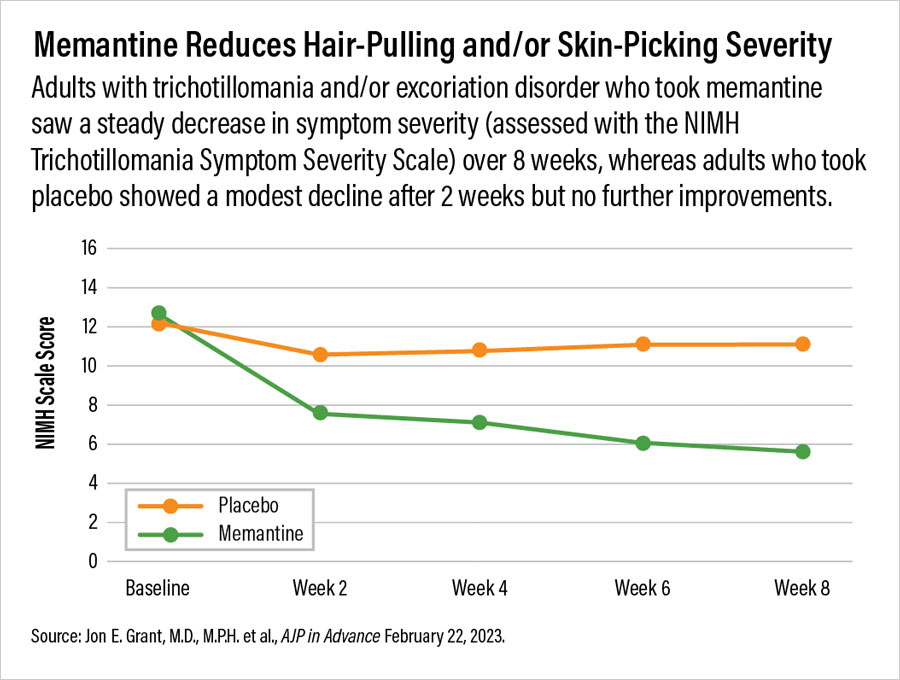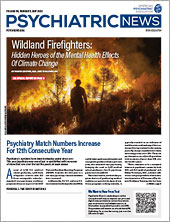The Alzheimer's medication memantine may be a promising treatment option for individuals with trichotillomania (hair-pulling disorder) and/or excoriation (skin-picking) disorder, according to a
clinical study published in
The American Journal of Psychiatry (AJP).
Trichotillomania and excoriation disorder are obsessive-compulsive disorders characterized by intrusive urges to pull or pick one’s hair and skin. There are currently no medications approved by the Food and Drug Administration to treat these disorders and only a few clinical trials to date have explored medication treatment to reduce patients’ symptoms.
One focus of clinical research in this area has been on the antioxidant N-acetylcysteine, which modulates the neurotransmitter glutamate. Jon E. Grant, M.D., M.P.H., a professor of psychiatry and behavioral neuroscience at the University of Chicago, leading researcher on trichotillomania and excoriation disorder, and the lead author of the
AJP report, noted that glutamate has been implicated in compulsive behaviors. In two separate trials, Grant and colleagues found that symptoms of trichotillomania and excoriation disorder dropped among patients who took N-acetylcysteine for 12 weeks (see trichotillomania study
here and excoriation study
here).
Grant and colleagues wanted to see if memantine, another glutamate modulator, might also reduce symptoms of trichotillomania and excoriation disorder. As described in the AJP study, the researchers recruited 100 adults (86 women, average age 31 years) for the trial; 53 of the patients had trichotillomania, 43 had excoriation disorder, and four had both disorders. Fifty-five participants were assigned daily memantine for eight weeks while the other 45 were given placebo pills. Patients were started on a 10 mg/day dose of memantine, which was then increased to 20 mg/day after two weeks.
Grant and colleagues evaluated the participants every two weeks using the NIMH Trichotillomania Symptom Severity Scale—a 6-item, 20-point scale that assesses such factors the frequency of pulling, intensity of urges, and the amount of interference in daily activities (the scale was modified to include references to skin picking for patients with excoriation disorder). The researchers also used the brief Clinical Global Impressions Improvement (CGI-I) scale to evaluate the participants’ overall improvement or worsening over time.
At baseline, the average NIMH Trichotillomania Symptom Severity Scale score among all participants was 12. After two weeks, the participants in the memantine group experienced about a 4-point drop in their severity scores, compared with a less than 2-point decrease in severity scores the placebo group. Scores in the memantine group continued to gradually decline, going below 6 points at eight weeks, whereas the placebo group saw no further improvement.
At the end of the study, 60.5% of participants in the memantine group were “much or very much improved,” compared with 8.3% in the placebo group, based on the CGI-I scale. Six participants in the memantine group (10.9%) stopped pulling/picking completely by the end of the trial, whereas only one (2.2%) of the participants in the placebo group achieved complete pulling/picking remission.
Memantine was also well tolerated, except for two cases of dizziness that led the participants to stop taking the medication. The most common side effects were fatigue/drowsiness; gastrointestinal issues, such as nausea or constipation; and dizziness.
“I think these results are very encouraging given that memantine and NAC [N-acetylcysteine] have a similar mechanism of action,” Grant said. “The theory that these disorders are related to disrupted glutamate activity holds water.”
Grant added that having medications that reduce symptoms of hair pulling and skin picking is important to reduce the stigma associated with these two disorders. These findings point to “a biological underpinning to these repetitive behaviors.”
Mohammed Jafferany, M.D., a professor of psychodermatology, psychiatry, and behavioral sciences at Central Michigan University College of Medicine, thinks these results are welcome news for patient care.
“Although the eight-week timeframe is short, since we know these are chronic conditions, the methods of the study were quite sound,” he said. Also, “more than 50% of participants showed improvement, which is something very promising.” Jafferany was not involved in this clinical trial.
Jafferany said that he has recommended N-acetylcysteine to several patients, and he would also consider prescribing memantine off label in his practice. (The generic memantine is relatively inexpensive even without insurance covering the medication, he noted.)
He told Psychiatric News some patients might be nervous about taking a dementia drug, but a careful explanation of the medication’s mode of action and efficacy should allay any fears.
“I think both of these medications [N-acetylcysteine and memantine] are worth trying with patients, but alongside established approaches like cognitive-behavioral therapy or habit-reversal therapy,” he said. “That’s where I have seen significant benefits.”
Grant is hopeful that the positive effects seen from his clinical work with both N-acetylcysteine and memantine may encourage other investigators or pharmaceutical companies to study glutamate-based therapeutics for trichotillomania and excoriation disorder. He noted that there has historically not been much funding in this area but given the excitement over glutamate-based treatments for depression, these disorders could be a great R&D opportunity.
“One strength of this area of psychiatry is that we actually have excellent animal models that mimic these conditions,” he said, referencing animal models that display excessive grooming. “The models can give investigators a leg up when testing potential medications.”
This trial was supported by the University of Chicago. ■

